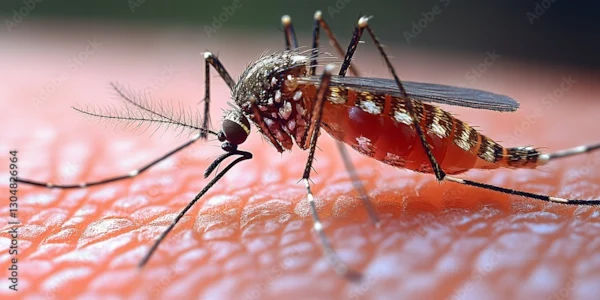West Nile Virus: All You Need To Know
Learn about West Nile Virus, its causes, symptoms, and effective prevention tips to stay protected. Transmitted through mosquito bites, this virus can cause mild flu-like symptoms or severe neurological complications. Stay informed and take precautions to reduce your risk of infection.

Written by Dr.Sonia Bhatt
Last updated on 3rd Jul, 2025

West Nile Virus (WNV) is prevalent in regions such as Africa, Europe, the Middle East, North America, and West Asia, primarily transmitted through a cycle involving birds and mosquitoes. It is capable of causing neurological illnesses and can be fatal. Although humans, horses, and other mammals can contract the virus, most infected individuals do not exhibit symptoms. The virus derives its name from the West Nile district in Uganda, where it was first discovered.
WNV is classified within the flavivirus genus and is part of the Japanese encephalitis antigenic complex of the Flaviviridae family. Transmission usually occurs via mosquito bites. Around 20% of those infected may experience mild symptoms, which can include fever, headache, and body aches, commonly known as West Nile fever. In rare cases, the virus can invade the nervous system, resulting in serious conditions like encephalitis or meningitis.
Causes and Transmission
As an arbovirus in the Flavivirus genus, WNV typically has an incubation period of two to six days after a mosquito bite, with symptoms potentially appearing up to 14 days later.
West Nile Virus (WNV) infects humans primarily through bites from infected mosquitoes, which acquire the virus from feeding on infected birds. The virus moves to the mosquito's salivary glands and can be transmitted during subsequent bites.
WNV can also spread through contact with infected animals, their blood, or tissues. Some cases have been linked to organ transplants, blood transfusions, and breastfeeding, including one maternal-to-fetal transmission.
There are no confirmed cases of human-to-human transmission through casual contact, and healthcare workers have not contracted the virus under standard infection control. However, laboratory personnel have reported transmission in certain cases.
Symptoms of West Nile Virus
Approximately 80% of people infected with West Nile Virus (WNV) are asymptomatic. Those who do show symptoms may develop:
Fever
Headache
Muscle aches
Nausea and vomiting
Diarrhoea
Rash (on the torso)
Swollen lymph nodes
Severe cases occur in about 1 in 150 infections. Older adults and immunocompromised individuals are at higher risk for severe symptoms and can cause:
Severe headache
High fever (over 39.5°C)
Stiff neck
Confusion
Muscle weakness
Uncontrolled movements
Seizures
Paralysis
Coma
Consult Top General Physician
Risk Factors for West Nile Virus
Several factors can elevate the likelihood of contracting West Nile Virus (WNV). Being exposed to mosquito bites, particularly in the summer months, significantly increases this risk. You may be more susceptible to serious complications if you:
Are aged over 60
Have received an organ transplant
Have a cancer diagnosis
Suffer from diabetes
Experience high blood pressure (hypertension)
Have kidney disease
Diagnosis of West Nile Virus
West Nile Virus (WNV) can be diagnosed using several methods, including:
IgG Antibody Testing: This checks for changes in antibody levels using enzyme-linked immunosorbent assay (ELISA)
IgM Antibody Capture ELISA: This test detects IgM antibodies specific to WNV.
Neutralisation Assays: These evaluate the ability of antibodies to neutralise the virus.
Reverse Transcription Polymerase Chain Reaction (RT-PCR): This method identifies viral genetic material.
Virus Isolation via Cell Culture: This involves growing the virus from a sample.
IgM antibodies are often found in cerebrospinal fluid (CSF) and serum from infected individuals at the time of diagnosis and can persist for over a year. Healthcare providers may perform blood or CSF tests to identify antibodies or other signs of WNV infection, typically in cases of severe illness. If there are indications of brain inflammation, imaging techniques like CT scans or MRIs may be used to examine the brain.
Treatment Options
There are no antiviral medications specifically for West Nile virus. Mild symptoms can typically be managed at home with over-the-counter (OTC) treatments, similar to those used for colds or flu.
The treatment approach will vary based on symptom severity, age, and overall health. In cases of severe disease, such as West Nile encephalitis or meningitis, intensive supportive care may be necessary. For severe neurological symptoms, hospital monitoring is essential. Treatment may focus on relieving symptoms and reducing brain swelling, and can include:
Anti Seizure Medications: To manage seizures.
Oxygen Therapy or Mechanical Ventilation: To assist with breathing.
Intravenous (IV) Fluids: To maintain hydration.
Corticosteroids: To help reduce inflammation.
Tube Feeding: If the patient cannot eat normally.
Hospitalisation: For close observation and care.
Infection Prevention: Strategies to avoid secondary infections, like pneumonia or urinary tract infections.
Nursing Care: To provide comprehensive support during recovery.
Prevention and Control
Without a vaccine for West Nile virus, it's essential to increase awareness of risk factors and educate the public on how to prevent infection.
Minimising Mosquito Transmission: Promote personal and community measures such as using mosquito nets, applying insect repellent, and wearing light-coloured, long-sleeved clothing. Communities should also work to eliminate mosquito breeding sites.
Preventing Animal-to-Human Transmission: Individuals should wear gloves and protective clothing when handling sick animals or their tissues, particularly during slaughtering.
Reducing Risks from Blood Transfusions and Organ Transplants: During outbreaks, implement restrictions and testing for blood and organ donations based on local epidemiological data.
Avoid Peak Times: Stay indoors when mosquitoes are most active, especially at dawn and dusk.
Use Insect Repellent: Apply insect repellent registered with the EPA on exposed skin and clothing before outdoor activities.
Wear Protective Clothing: Opt for lightweight long trousers and long-sleeved shirts to cover as much skin as possible.
Eliminate Standing Water: Regularly empty and clean areas that collect water, like birdbaths and blocked gutters, to deter mosquito breeding.
Keep Mosquitos Out: Ensure doors and windows have screens or remain closed to prevent mosquitoes from entering.
Travel and Sleeping Precautions: Close windows where possible, or use mosquito nets when sleeping outdoors to reduce the risk of bites.
Complications and prognosis of West Nile virus
The outlook for individuals infected with West Nile virus can vary widely. The primary complication is inflammation in the nervous system, affecting the brain and spinal cord, which can result in conditions like encephalitis and meningitis.
For individuals who do experience severe symptoms, the prognosis is influenced by the severity of the illness, their age, and overall health. Although many people recover fully, a small number may face long-term health issues that can affect their quality of life. Ongoing follow-up with healthcare professionals can assist in managing these lasting effects.
Potential long-term effects of a severe West Nile infection may include:
Impaired memory
Loss of hearing
Walking difficulties or issues with gait
Muscle weakness
Altered reflexes
Depression
Conclusion
While mosquitoes can be quite bothersome, they can also transmit viruses such as West Nile. Fortunately, most of the people infected do not exhibit symptoms, and most have a low risk of serious illness. To protect yourself, take measures to avoid bites, and seek advice from a healthcare provider if you develop any symptoms. Additionally, since mosquitoes can breed in any standing water that lasts longer than four days, reducing such sources around your home can help manage their numbers.
Consult Top General Physician
Consult Top General Physician

Dr. Syed Ismail Ali
General Practitioner
7 Years • MBBS
Hyderabad
Apollo 24|7 Clinic, Hyderabad

Dr. M L Ezhilarasan
General Practitioner
6 Years • MBBS
Visakhapatnam
Apollo 24|7 Clinic - Andhra Pradesh, Visakhapatnam

Dr. D Bhanu Prakash
General Practitioner
10 Years • MBBS, AFIH, Advanced certificate in critical care medicine, Fellowship in critical care medicine
Hyderabad
Apollo 24|7 Clinic, Hyderabad

Dr. Suraja Nutulapati
General Physician/ Internal Medicine Specialist
10 Years • MBBS, MD (Internal Medicine)
Hyderabad
Apollo 24|7 Clinic, Hyderabad
(850+ Patients)

Dr. Mohammed Kamran
General Practitioner
5 Years • MBBS, FIDM
Nashik
Apollo 24|7 Clinic - Maharashtra, Nashik
Consult Top General Physician

Dr. Syed Ismail Ali
General Practitioner
7 Years • MBBS
Hyderabad
Apollo 24|7 Clinic, Hyderabad

Dr. M L Ezhilarasan
General Practitioner
6 Years • MBBS
Visakhapatnam
Apollo 24|7 Clinic - Andhra Pradesh, Visakhapatnam

Dr. D Bhanu Prakash
General Practitioner
10 Years • MBBS, AFIH, Advanced certificate in critical care medicine, Fellowship in critical care medicine
Hyderabad
Apollo 24|7 Clinic, Hyderabad

Dr. Suraja Nutulapati
General Physician/ Internal Medicine Specialist
10 Years • MBBS, MD (Internal Medicine)
Hyderabad
Apollo 24|7 Clinic, Hyderabad
(850+ Patients)

Dr. Mohammed Kamran
General Practitioner
5 Years • MBBS, FIDM
Nashik
Apollo 24|7 Clinic - Maharashtra, Nashik




